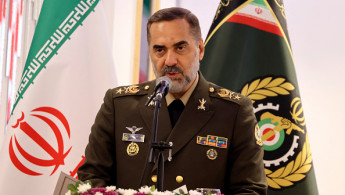EU sanctions Iran's defence minister, IRGC over drones, missiles
The European Union on Friday imposed sanctions on Iran's defence minister, Mohammad Reza Ashtiani, and the country's Revolutionary Guards for sending missiles and drones being used against Israel and Ukraine and in the Red Sea.
The high-profile measures also targeted the commander of the Guard's Quds Force for his role in transferring missiles used by Iran's Hezbollah proxy militia against Israel, and those used by Houthis firing from Yemen.
A key armed forces command centre, the head of a state aviation company and an electronics company were also sanctioned.
The listings followed Iran's April 13 air assault on Israel, in which it launched more than 300 drones and missiles, most of which were shot down.
That assault was in response to an air strike on Iran's diplomatic compound in Syria, widely blamed on Israel, that killed eight Revolutionary Guards members.
The EU vowed in the wake of the air attack to impose new sanctions on Iran. The United States and Britain already did so in late April.
The EU sanctions also come as the West looks to punish Iran and North Korea for giving military help to Russia in its war in Ukraine, and as Western warships seek to counter Iran-supplied missiles fired by Huthis in the Red Sea.
The Council of the EU said in a statement that those listed were involved in sending drones to Russia and drones or missiles to "armed groups and entities undermining peace and security in the Middle East and the Red Sea region".
"As defence minister, Ashtiani is directly involved in Iran's UAV (drone) programme and is involved in transferring Iran's UAVs to Russia in support of its war of aggression against Ukraine," the EU sanctions listing said.
The Islamic Revolutionary Guard Corps navy was listed for "facilitating the transport of Iranian arms," including drones and missiles to "armed groups like the Huthis and Hezbollah to undermine peace and security in the Middle East and Red Sea region," it said.
The Quds Force commander, Esmail Qaani, was likewise accused of helping transfer drones and missiles to those groups.
The Revolutionary Guards' Quds Force is the elite unit responsible for marshalling, supplying and training Iran's proxies in the Middle East, and for foreign operations.
The army command centre listed, the Khatam al-Anbiya Central Headquarters, "is at the core of Iran's military forces and therefore involved in transferring UAVs to Russia in support of its war of aggression against Ukraine and to armed groups and entities undermining peace and security in the Middle East and the Red Sea region," the EU said.
Its commander, Gholam Ali Rashid, was included in the sanctions.
The electronics firm targeted was Kavan Electronics Behrad, along with its CEO and chairman, for international procurement of components used in the manufacture of drones, and for helping transfer drones to Russia.
The sanctions -- which prohibit any EU citizen or company doing business with the listed individuals and organisations -- are some of the most prominent Brussels has imposed on Iran.
Tehran is currently gearing up for carefully managed elections to name a successor to president Ebrahim Raisi, who died in a helicopter crash on May 19, along with his foreign minister Hossein Amir-Abdollahian.
Real power, however, remains in the hands of Iran's elderly supreme leader Ayatollah Ali Khamenei, and the thousands of shadow officials that surround him.





 Follow the Middle East's top stories in English at The New Arab on Google News
Follow the Middle East's top stories in English at The New Arab on Google News


